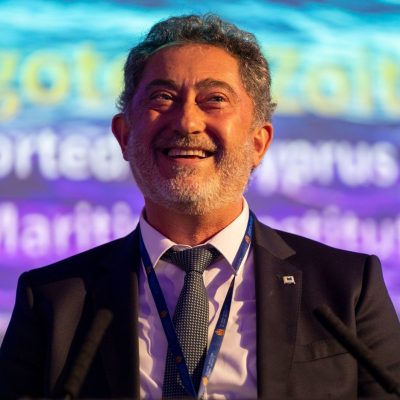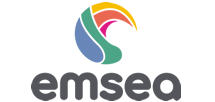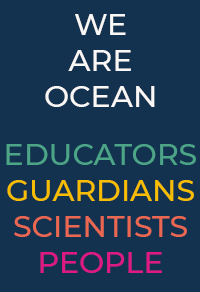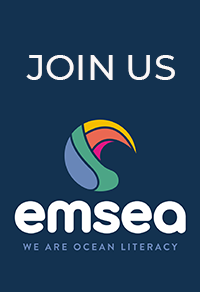Zacharias Siokouros (CMMI): ocean literacy as enabler for a sustainable Blue Economy
This article is part of the blog series ‘Meet the members’ in which you’ll get to know the EMSEA members, what drives them and what inspires them. They’ll share their experience, their good practices, their challenges. They’ll talk about what ocean literacy means to them and how they hope to reach it. Today we meet Zacharias Siokouros, CEO of the Cyprus Marine & Maritime Institute (CMMI).
A naval architect and marine engineer, Zacharias Siokouros has over 30 years of experience in the shipping industry. In 2019 he made a career switch and became the CEO of the Cyprus Marine & Maritime Institute (CMMI). Inspired by Jules Verne and Jacques Cousteau, he is now looking for modern alternatives to inspire today’s young people.

CMMI was founded in 2019, but the idea was conceived years earlier. ‘It all started with Mar.In.E.M’, Siokouros explains. ‘In 2010, some colleagues and I felt there was something missing in Cyprus in relation to marine and maritime education and research. As a result, Mar.In.E.M was founded, an organisation that quickly took a leading role in Blue Career events at schools and universities. There, we explained different opportunities in the Blue Economy to students. Later on, we applied for funding with a number of local partners and that led to the start of CMMI. Of course, once it was founded, COVID hit and there I was… For eight months, a lonely CEO without any staff,’ he laughs.
CMMI’s expertise
Despite the initial setbacks, five years later CMMI is a growing research centre with about 60 researchers and administrative staff, working on approximately 35 projects and divided into several centres. The marine technology centres conduct research in the areas of digitalisation, robotics and decarbonisation of the shipping industry. At the marine sciences centres marine biologists and oceanographers investigate marine and coastal ecosystems, aquaculture and the marine environment in general. The marine social sciences centres are responsible for promoting ocean literacy, especially among young people, and for conducting research on marine cultural heritage and on marine and maritime policy.
‘As far as policy is concerned, it’s important to deliver quick and tangible results,’ Siokouros stresses. ‘If we want policy to change and policymakers to offer funding opportunities, then we need to show real solutions to current pressing issues, such as climate change or biodiversity loss.’ That is exactly what CMMI is trying to do. This month, for example, the organisation has launched its first zero-emissions vessel. The battery-driven ship is around 10 metres long and will be used for both research purposes and CMMI’s ocean literacy programme. It’s a huge step in the decarbonisation of the shipping industry. Apart from this, CMMI is also developing several robots that can either sail on the sea surface or dive underwater to monitor the ocean environment; and designing and manufacturing artificial reefs to attract wildlife and give the underwater biodiversity a real boost.

Importance of ocean literacy
These projects not only gain attention from policymakers, but from young people as well. ‘I don’t think young people today read a lot of Jules Vernes anymore,’ Siokouros grins. ‘We need to excite them in other ways, more modern ways. Technology is a good tool for that. And once you get them excited, they’ll learn how to respect and protect the sea.’
Siokouros calls ocean literacy an ‘enabler for the rest of the work CMMI is doing’. ‘The sea is suffering and we need to protect it,’ he explains. ‘Therefore, we need to make people understand why it is important. Most people know about the importance of trees, but have no idea what the sea can do. If we teach them that, they get more sensitive to the ocean’s problems. For some people ocean literacy might even serve as the stepping stone towards a blue career or a career dedicated in addressing those challenges. The more people we can engage in this sector, the more research we’ll be able to do, the better we’ll be able to protect our ocean.’
Siokouros stresses the importance of a better understanding of our ocean. He gives the example of an eddy in the eastern Mediterranean that seems to be affected by changing temperatures and salinity. ‘This may affect the whole circulation of the Mediterranean. We don’t understand yet what the long-term impacts could be. With so many people dependent on the Mediterranean, it is of uttermost importance we understand these processes better. Not only to try to prevent or mitigate them, but also to be able to adapt to a changing future.’

Ocean literacy activities
According to CMMI, ocean literacy should start from an early age. Therefore, they organise projects at kindergarten and primary schools where they help children build boats from recycled materials, such as plastic bottles. They then organise competitions where the children have to row these boats at sea.
Last summer, CMMI organised a Blue Youth Camp at Ayia Napa. For a week, about 20 children between the ages of 10 and 15 were following lectures and activities including water sports. A short cruise had also been organised, providing children with an opportunity to discuss and observe marine life in the Mediterranean region, such as seals, turtles and Posidonia oceanica meadows. At the end of the week most of them didn’t want to go home. One child got so excited during a seaweed and coral workshop, he said he wanted to become a marine biologist. Blue Youth Camp proved to be such a success that CMMI is now planning to make it a yearly event.

However, the ultimate goal is to involve public authorities and in particular convince the local Ministry of Education to add ocean literacy on schools’ curricula. ‘We can run a number of smaller projects, but still miss out on the majority of young people. If we want to reach all of them, we need to get ocean literacy into the formal school programme,’ Siokouros emphasizes. Not an easy thing to do, since current school programmes are already quite tight. To avoid replacing existing courses, the best solution would be to incorporate ocean literacy in courses that are already in place. ‘I know this teacher at a primary school who managed to embed ocean literacy in about everything: music, gymnastics, …‘ Siokouros says impressed. ‘Besides, mathematics and physics also become much more interesting if you can link theory to practice, for example in maritime robotics or ocean currents.’
Siokouros is certainly optimistic about the future. That his optimism is quite contagious, was illustrated nicely at an event in London, where a young woman approached Siokouros, asking if he could remember her. She was Cypriot and had heard Siokouros speaking about Blue Careers some years earlier. She found his speech so inspiring that she became a naval architect herself.
An inspirational force, Siokouros is determined to introduce Blue Economy to as many Cypriots as possible.

Top tips for Ocean Literacy organisations by Zacharias Siokouros
- ‘If you address policymakers, you need to speak their language. Scientists often use language that is too hard to understand. Policymakers need to-the-point briefs in 1 to 2 pages in clear and non-scientific language. Also, you need to find the right angle to approach them. Politicians are more eager to engage on something that interests them, so make your science useful to them. Find a way to show them how your project benefits them.’
- ‘When addressing the public, storytelling is definitely the way to go. Children, but adults as well, are more eager to listen when something is told in a story, like you would hear from your grandparents. If you can add mythology or a personal anecdote into your science, people are much more likely to connect with what you’re saying and to remember it. We should be teaching storytelling to all of our scientists.’
Text by Anke de Sagher for EMSEA
Photos by CMMI

More on Zacharias Siokouros and CMMI
Website · Facebook · YouTube · X · LinkedIn CMMI · LinkedIn Zacharias Siokouros
Want to join the community? Find out how to become an EMSEA member!


